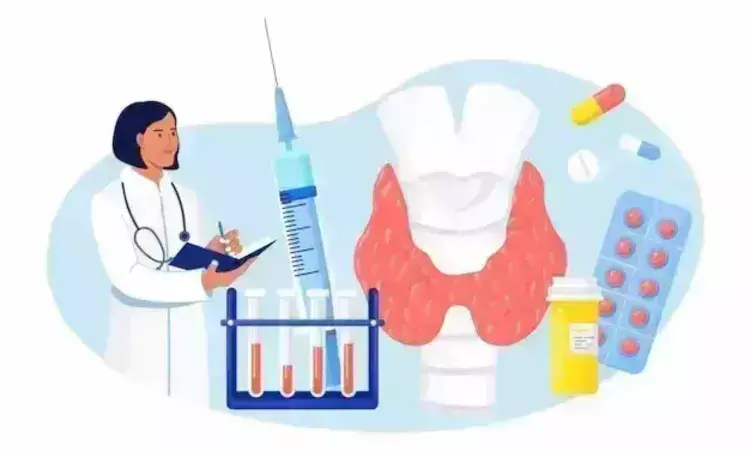- Home
- Medical news & Guidelines
- Anesthesiology
- Cardiology and CTVS
- Critical Care
- Dentistry
- Dermatology
- Diabetes and Endocrinology
- ENT
- Gastroenterology
- Medicine
- Nephrology
- Neurology
- Obstretics-Gynaecology
- Oncology
- Ophthalmology
- Orthopaedics
- Pediatrics-Neonatology
- Psychiatry
- Pulmonology
- Radiology
- Surgery
- Urology
- Laboratory Medicine
- Diet
- Nursing
- Paramedical
- Physiotherapy
- Health news
- Fact Check
- Bone Health Fact Check
- Brain Health Fact Check
- Cancer Related Fact Check
- Child Care Fact Check
- Dental and oral health fact check
- Diabetes and metabolic health fact check
- Diet and Nutrition Fact Check
- Eye and ENT Care Fact Check
- Fitness fact check
- Gut health fact check
- Heart health fact check
- Kidney health fact check
- Medical education fact check
- Men's health fact check
- Respiratory fact check
- Skin and hair care fact check
- Vaccine and Immunization fact check
- Women's health fact check
- AYUSH
- State News
- Andaman and Nicobar Islands
- Andhra Pradesh
- Arunachal Pradesh
- Assam
- Bihar
- Chandigarh
- Chattisgarh
- Dadra and Nagar Haveli
- Daman and Diu
- Delhi
- Goa
- Gujarat
- Haryana
- Himachal Pradesh
- Jammu & Kashmir
- Jharkhand
- Karnataka
- Kerala
- Ladakh
- Lakshadweep
- Madhya Pradesh
- Maharashtra
- Manipur
- Meghalaya
- Mizoram
- Nagaland
- Odisha
- Puducherry
- Punjab
- Rajasthan
- Sikkim
- Tamil Nadu
- Telangana
- Tripura
- Uttar Pradesh
- Uttrakhand
- West Bengal
- Medical Education
- Industry
Thyrotoxicosis tied to higher risk of cognitive disorders among older adults: JAMA

USA: A low thyrotropin (TSH) level from either exogenous or endogenous thyrotoxicosis is tied with a higher risk of incident cognitive disorder among older adults, a recent study published in JAMA Internal Medicine has revealed. Thyrotoxicosis is defined as excess thyroid hormone levels in the body.
Exogenous thyrotoxicosis (caused by ingesting thyroid medication) and endogenous thyrotoxicosis (caused by thyroid disorders such as hyperthyroidism and Graves’ disease) were both associated with a higher likelihood of developing a cognitive disorder.
“Some prior studies have suggested that thyrotoxicosis was associated with an increased risk of cognitive disorders,” says Roy Adams, Ph.D., M.S., first author of the study and assistant professor of psychiatry and behavioural sciences at the Johns Hopkins University School of Medicine. “But results have been mixed, and exogenous thyrotoxicosis was mostly excluded from those studies.”
According to GoodRx, thyroid hormone is among the most common prescriptions in the United States. A previous Johns Hopkins Medicine study found that up to 20% of people prescribed thyroid hormone may be overtreated, placing them at risk for exogenous thyrotoxicosis.
“Our goal was to investigate whether aggressive treatment practices, which can cause exogenous thyrotoxicosis, can also possibly cause cognitive harm,” says Adams. “Understanding the negative effects of overtreatment is critical to help guide clinicians in how they prescribe thyroid hormone therapy.”
The research team selected participants for the study from a Johns Hopkins Medicine electronic health record database. The team identified 65,931 qualified participants age 65 and older who received primary care within the Johns Hopkins Health System between Jan. 1, 2014, and May 6, 2023. The average age during the first recorded primary care visit was 71, and all patients had at least two visits that were 30 or more days apart.
Results showed that all-cause thyrotoxicosis-endogenous and exogenous thyrotoxicosis combined-was associated with a 39% increase in the risk of cognitive disorder diagnosis across age groups. Of patients who experienced thyrotoxicosis, 11% were diagnosed with a cognitive disorder by age 75 versus 6.4% of patients who did not experience thyrotoxicosis. By age 85, 34% of patients who had thyrotoxicosis were diagnosed with a cognitive disorder, compared with 26% of patients who did not have thyrotoxicosis. The excess risk associated with thyrotoxicosis persisted with an analysis using statistical models that examined possible sources of bias and alternative reasons for the associations.
The study also found that among those prescribed thyroid hormone, the level of exposure to thyroid hormone correlated with the degree of risk for a cognitive disorder. Patients with a more severe degree of excess thyroid hormone had a 65% increased risk of cognitive disorder, while those with a more moderate degree of excess thyroid hormone had a 23% increased risk.
“Our results suggest that an increased risk of cognitive disorders is among the potential negative consequences of thyroid hormone excess, a common consequence of thyroid hormone therapy,” says Jennifer Mammen, M.D., Ph.D., the study’s senior author and assistant professor of medicine at the Johns Hopkins University School of Medicine. “Clinicians considering thyroid hormone therapy in older adults should avoid overtreatment by using age-appropriate treatment strategies.”
Reference:
Adams R, Oh ES, Yasar S, Lyketsos CG, Mammen JS. Endogenous and Exogenous Thyrotoxicosis and Risk of Incident Cognitive Disorders in Older Adults. JAMA Intern Med. Published online October 23, 2023. doi:10.1001/jamainternmed.2023.5619.
Dr Kamal Kant Kohli-MBBS, DTCD- a chest specialist with more than 30 years of practice and a flair for writing clinical articles, Dr Kamal Kant Kohli joined Medical Dialogues as a Chief Editor of Medical News. Besides writing articles, as an editor, he proofreads and verifies all the medical content published on Medical Dialogues including those coming from journals, studies,medical conferences,guidelines etc. Email: drkohli@medicaldialogues.in. Contact no. 011-43720751


